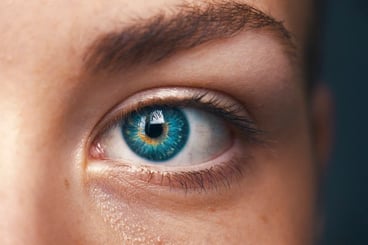Skin cancer of the eyes: what to look out for
Did you know that your eyes are susceptible to skin cancer? Wearing sunglasses isn't just a fashion trend or an everyday comfort; looking directly into the sun or subjecting your eyes to glare from concrete, grass, water or sand can generate significant damage to your vision and actually cause skin cancer.
Developing skin cancer on the actual eyeball is rare, but definitely possible. Ocular melanoma is primarily caused by UV exposure but can also result from a secondary spread of cancer cells from elsewhere in your body. Symptoms to look out for include:
- Flashes or specks in your vision
- A growing dark spot on the iris
- Changes in the shape of your pupil
- Blurry vision in one eye
- Loss of peripheral vision.
 The thin tissue surrounding your eyes (including the eyelids) are also very vulnerable to damage from the sun, so developing non-melanoma skin cancer in the sensitive skin around your eyes is far more common than you might think.
The thin tissue surrounding your eyes (including the eyelids) are also very vulnerable to damage from the sun, so developing non-melanoma skin cancer in the sensitive skin around your eyes is far more common than you might think.
Wearing sunglasses and a hat that shades your face can help prevent skin cancer near the eyes, as many people stop short of covering this area when applying sunscreen. And even when we manage to cover our eyelids and tear troughs with enough product, we tend to wipe it off prematurely while swimming or sweating.
Did you know the average person touches their face 2,000 to 3,000 times a day?
The majority of skin cancers that develop around the eyes are basal cell carcinomas. While this form of cancer rarely spreads to the lymph nodes or other parts of the body, it can grow large enough to cause disfigurement around the eyes and leave an unsightly scar once removed. Squamous cell carcinoma accounts for a small percentage of eyelid cancers, too. This type has a higher chance of spreading and can become life-threatening.
Symptoms of skin cancer on the eyelid include:
- A spreading growth on the eyelid that can be red, brown or black
- Broken skin that won't heal
- Changes in the skin's appearance
- Chronic infection of the eyelid
- Loss of eyelashes
- Swelling or thickening of the eyelid.
HAVE YOU BEEN DIAGNOSED?
If you have been diagnosed with a skin cancer in or near your eye, don't panic. While it may seem frightening, experienced skin cancer surgeons routinely see these cases and know what to do. Even people who have undergone skin cancer treatments in the past might feel squeamish about sitting through a procedure so close to the eyes. However, most of the surgery can be performed while your eyes are closed or with an opaque contact lens inserted into the affected eye.
Most patients will experience swelling and bruising around the eye for a few days after surgery, and it can take up to a year for the scar to heal completely. However, the sooner the skin cancer is detected and treated, the better cosmetic outcome you can expect.
- Tags:
- Detection
- Prevention
- Treatment
